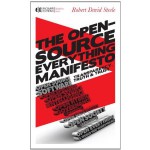
The Open Source Everything Manifesto Chapter 6 Whole-Systems Thinking Extract III
Even before the digital information explosion, the rapid expansion of scientific, social scientific, and humanities knowledge led to the fragmentation of academic disciplines, and then increasing fragmentation as sub-disciplines developed. Figure 14 depicts how little of the knowledge can be accessed via online search, the default option for all too many people. Add 183 languages in which knowledge is created, and the Babel factor is a multiple order of magnitude worse than a quarter century ago.
. . . . . . . . .
There is one other fragmentation that must be addressed. I call them “the eight communities of intelligence” that do not share information with one another in any coherent manner, illustrated in Figure 15. I use a figure, having listed these communities briefly above, because I want to illuminate two points: that they all share a “green” information commons; and that there are outer rings of yellow, orange, and red “restricted information information that demand security and privacy.
Each of these communities have vital original data, information, and analytical insights on any given issue. They are not trained, equipped, organized, nor culturally disposed to share information they have, not even within their own community.
. . . . . . . . .
The fragmentation of knowledge is much worse than this. When you look at data in context–what we should be able to do with all information in all languages all the time–we immediately see many more divisions in terms of time, space, discipline, and domain.
Review of the Book by Ralph Peters … Manifesto Extracts at Phi Beta Iota … Book Page at Amazon . Book Page at Barnes & Noble . Book Page at McNallyRobinson . Book Page at North Atlantic Books (Publisher) . Book Page at Powell’s Books . Book Page at Random House . Book Page at Super Book Depot



